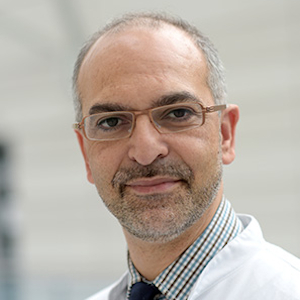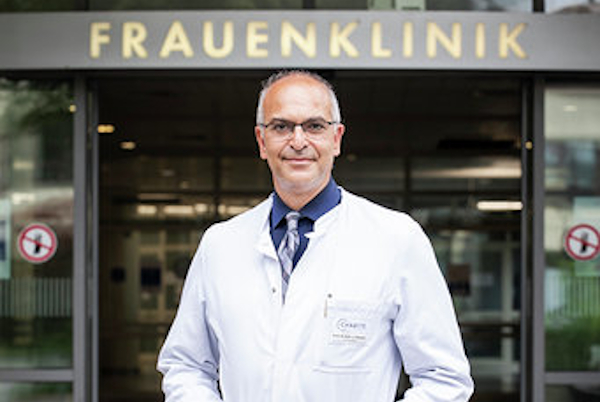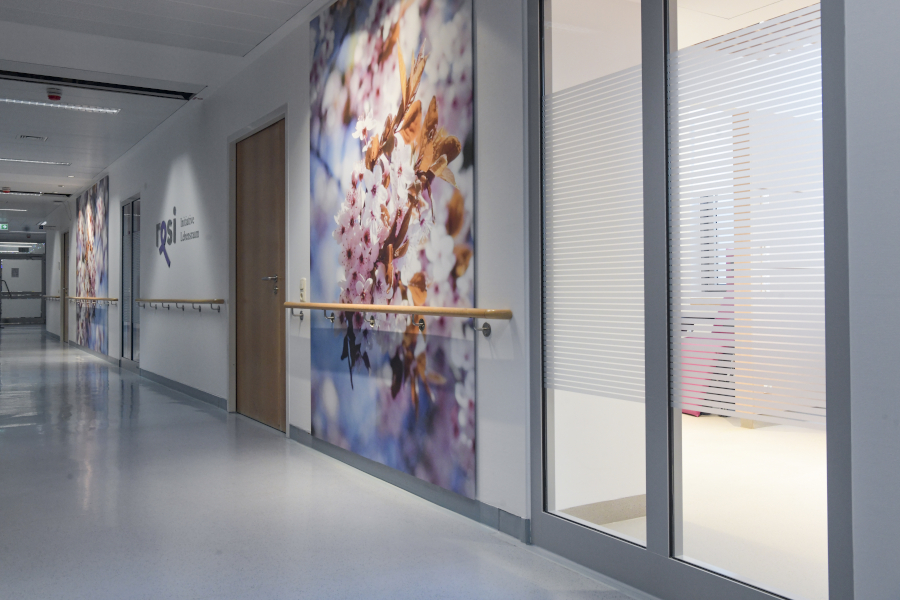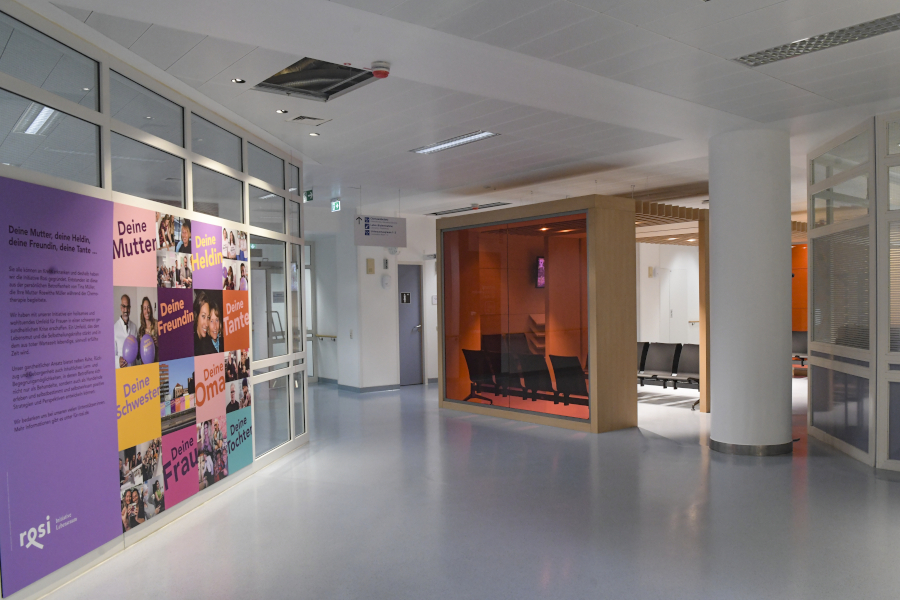Gynecological Oncology Berlin: Prof Dr Dr h.c. Jalid Sehouli
Treatment focus
- Ovarian cancer (ovarian carcinoma), Fallopian tube cancer (tubal carcinoma), Peritoneal cancer (peritoneal carcinoma)
- Borderline tumors (BOT)
- Cervical cancer (cervical carcinoma)
- Uterine cancer (endometrial carcinoma)
- Vulvar cancer and vaginal cancer (vulvar and vaginal carcinoma)
- Gynecological sarcomas, neuroendocrine tumors, and other rare tumors
- Endometriosis
Medical Range
Range of Diagnostic Services
- Ultrasound examination (sonography)
- Computed tomography (CT)
- Magnetic resonance imaging (MRI)
- Positron emission tomography (PET)
- Cytology (PAP smear, abdominal fluid sample)
- Colposcopy (vaginal examination)
- Biopsy
- Hysteroscopy (examination of the uterus)
- Diagnostic laparoscopy (LSK)
- Pathology
- Lynch syndrome consultation hours
Range of Therapeutic Services
- GynOnko emergency assistance – therapy planning without waiting times
- Interdisciplinary tumor conference (preoperative and postoperative, online, molecular genetic) – interprofessional decision-making in a team of experts, also interdisciplinary with visceral and vascular surgery, neurosurgery, and trauma surgery
- Prehabilitation – targeted preparation for treatment/therapy
- Written second opinion and video consultations
- Highest tumor-free rate in Germany – thanks to an experienced interdisciplinary team
- Fertility preservation – certified by fertiprotect
- Minimally invasive, robot-assisted tumor surgery (keyhole surgery) – individually planned whenever possible
- Individualized surgery, including HIPEC, if indicated
- Specialized nursing staff – empathetic, highly professional, specialized, and academically trained care
- Pain-free hospital – special pain management team available around the clock
- Psycho-oncological care
- Social services and social conference – individual counseling and support with social, legal issues, and everyday life
- Physiotherapy and active ward – exercise options ranging from exercise bikes to video trainers
- Complementary therapy options: nutritional therapy, art therapy, writing therapy, aromatherapy
- Gyn Activ Lounge – lounge and meeting room with massage chairs, library, Pixformance video trainer, and table tennis table
- Art in the hospital – first certified center for art in medicine
- Newly designed chemotherapy outpatient clinic – modern architecture with a feel-good atmosphere
- Cooling caps – to reduce chemotherapy-related hair loss
- Sexual counseling
- ASV team – reliable outpatient care during chemotherapy
- Largest gynecological study center in Europe
- First and largest tumor bank for ovarian cancer (TOC)
- Largest sarcoma registry in the world – contribution to international research
- Survivorship Clinic – consultation hours for long-term survivors with long-term effects
- Aftercare even for complex cases and rare diseases
More Information
Card
Prof Dr Dr h.c. Jalid Sehouli is a specialist in gynecological oncology and Director of the Clinic for Gynecology with Center for Oncological Surgery (CVK) and Clinic for Gynecology (CBF) at Charité – Universitätsmedizin Berlin. Professor Sehouli is also Head of the Gynecological Tumor Center and European Competence Center for Ovarian Cancer (EKZE).
At the Charité, one of the largest university hospitals in Europe, Professor Sehouli treats and operates on gynecological tumor diseases using an interdisciplinary approach based on the latest scientific findings. The focus is on the individual needs and wishes of patients.
Specialist in Diagnosis & Treatment of Ovarian Cancer in Berlin
Ovarian cancer is a very complex disease requiring a great deal of experience and expertise to treat correctly. Prof Dr Sehouli's team at the Centre for Gynaecology and Oncological Surgery is highly specialized and offers professional treatment that has been tried and tested over many years as part of a certified center of excellence for ovarian cancer.
Around 8000 women are diagnosed with ovarian cancer in Germany every year. This is a stressful situation for everyone involved and requires a great deal of sensitivity and expertise from the medical facility. Due to a lack of early warning symptoms and screening options, in many cases, the cancer is only discovered at an advanced stage, and both genetic and environmental factors influence uncontrolled cell growth. The number of female menstrual cycles also plays a role. The risk of developing the disease increases with age.
At Charité Berlin, under the direction of Prof Dr Sehouli, comprehensive and rapid diagnostics are carried out in cases of suspected ovarian cancer, and the necessary steps are then taken within a very short time. Patients are fully informed at all times, and sufficient time is taken to address any questions that arise.
Therapeutic Approaches and Surgical Measures
The two main pillars of therapy in the treatment of ovarian cancer are surgery and chemotherapy. Successful surgery is the most important step and the key to treatment. Many years of surgical experience and expertise, as well as the quality of treatment, significantly influence the prognosis, which is why an experienced team of physicians is of immense importance.
The highly experienced gynecological, oncological, and interdisciplinary treatment team at the Charité Berlin Cancer Center enables successful and excellent surgical results. The primary goal is the complete removal of visible tumor tissue and histological confirmation of the diagnosis. The surgery is the basis for the tumor staging.
It is carried out using a longitudinal open surgical incision, whereby the highly complex procedure can take around five hours on average and varies greatly depending on the tumor and the patient. The experienced surgeons in Berlin remove the uterus, fallopian tubes, ovaries, surrounding tissue, and lymph nodes.
An adequate surgical result has the highest priority and should therefore only be carried out in certified centers such as Charité Berlin.
Chemotherapy and Aftercare
Depending on the tumor stage, chemotherapy is administered intravenously a few weeks later. The aim is to combat microscopic tumor residues or provide palliative relief of symptoms.
Treatment is carried out in six cycles, with an interval of three weeks between individual administrations. The simultaneous effect on healthy body cells can lead to side effects, which the Berlin treatment team informs patients about in advance and carefully manages if they occur.
In addition to chemotherapy, drugs for antibody therapy and subsequent maintenance therapy are typically administered in most cases. This serves as a targeted treatment strategy and helps prevent recurrences.
At the Charité, patients with cancer have the opportunity to participate in clinical trials, allowing them to receive the most modern and effective care. Whether participation is an option and how the trials are conducted are explained in detail and recorded accordingly.
Great importance is also attached to aftercare, which is used for essential and close monitoring, as well as to support and accompany the patients concerned beyond treatment.
Many Years of Experience in the Treatment of Peritoneal Cancer (Peritoneal Carcinomatosis)
Peritoneal cancer is caused by the spread of tumor cells into the abdominal cavity and can occur in advanced ovarian cancer. The treatment of advanced metastatic tumors is exceptionally complex and requires in-depth knowledge and extensive experience.
The Department of Gynecology at Charité Berlin handles a substantial number of complex cases and has consistently demonstrated its high level of expertise in planning and implementing individual treatment steps and therapy options through a multimodal and highly professional approach.
Experts in the Treatment of Endometrial Cancer
Professor Jalid Sehouli is also a renowned expert in endometrial cancer (endometrial carcinoma). At the Charité, high-performance medicine and individualized therapy concepts tailored to the needs and health status of each patient are combined.
Treatment of endometrial cancer usually begins with a surgery to remove the uterus. If there is a higher risk of the cancer spreading, the ovaries and lymph nodes are also removed. After the surgery, treatment is often combined with radiotherapy or chemotherapy to fight any remaining cancer cells.
Hormone therapy can also be an option for slow-growing endometrial cancer, especially for patients who wish to preserve their fertility.
Outstanding expertise in the treatment of cervical cancer
The lower part of the uterus is known as the cervix. Usually caused by HPV, the cells can also degenerate here, and cervical cancer can develop. The risk increases, especially if the virus persists, so regular cancer screening with a PAP smear of the cervix and prophylactic vaccination are of great importance.
Other important risk factors are smoking and a weakened immune system. The exact causes and development mechanisms of cervical cancer are still the subject of ongoing research.
The treatment for cervical cancer is the removal of the uterus, known as a radical hysterectomy. However, this procedure is associated with a relatively high complication rate and the risk of injury to surrounding nerves. The gynecology department at Charité has therefore developed a technique for exposing the nerves, allowing for gentle manipulation while preserving bladder and rectal function to the best possible extent. This enables better intraoperative navigation options and the most significant possible expansion of the surgical area.
The specialists can use the so-called trachelectomy for the treatment of cervical cancer in women with an existing desire to have children and tumors that are smaller than two centimeters. This minimally invasive procedure enables patients to become pregnant at a later date. Prof Dr Sehouli and his team will explain all the options in detail beforehand and provide patients with detailed and professional advice. Aftercare following the procedure is also closely monitored at the highest level.
State-of-the-Art Therapy for Dysplasia (Cell Changes in the Cervix)
Tissue changes in the cervix, vagina and labia are known as dysplasia and are precancerous conditions. They require professional check-ups and monitoring. Regular screening and early detection measures are therefore of great relevance for the prevention of cervical cancer.
A colposcopy is therefore carried out as part of the dysplasia consultation if cell changes are detected, to optically enlarge the cervix with a device and assess it precisely. A small biopsy may be taken and examined histologically. Most cell changes in the cervix are caused by HPV, which is transmitted during sexual contact. The viral disease usually heals itself. There is a higher risk of the virus persisting in cells and causing cell changes, particularly with certain risk factors, such as a weakened immune system and nicotine abuse.
If severe dysplasia is detected, the doctors in Berlin usually advise conization, a cone-shaped excision of the affected cervical area. Following this, regular check-ups and cancer screenings are crucial.
Gentle Removal of Myomas from the Uterus
Benign muscle nodules in the uterus are very common and remain asymptomatic in many cases. The cause of uterine myomas is unknown, but a genetic component has been identified. The female sex hormone estrogen stimulates the growth of myomas; around 15 to 25 percent of all women of childbearing age are affected by this benign disease.
Especially larger myomas can cause discomfort and lead to irregular, painful, or very heavy periods. Diffuse abdominal pain or discomfort when urinating due to pressure on the bladder can also occur. The complex of symptoms can sometimes significantly restrict the quality of life of the women affected.
The muscle nodules are differentiated according to their location and can grow within the uterine cavity, within the wall layer, or even outside the uterus. Depending on the type of myoma, different treatment options can be considered. The specialists at Charité Berlin thoroughly explain all treatment options to patients, offering a wide range of medical and surgical treatment methods to choose from. Charité offers a comprehensive range of myoma treatments to effectively alleviate patients' symptoms.
Curriculum Vitae
| October 2014 | Acceptance of W3 Professorship for Gynecology at Charité – Universitätsmedizin Berlin |
| December 2013 | Appointed Director of the Clinic for Gynecology, Charité Campus Benjamin Franklin |
| October 2013 | Offer of a Professorship to the Universitätsklinikum Hamburg-Eppendorf |
| April 2011 | Appointed Director of the Clinic for Gynecology, Charité Campus Virchow-Klinikum |
| October 2007 | Acceptance of W2 Professorship for Gynecology at Charité – Universitätsmedizin Berlin |
| September 2006 | Facultative Further Training: Specialization in Gynecological Oncology in the Field of Gynecology and Obstetrics |
| January 2005 | Habilitation at Humboldt University on the Topic of "Multimodal Management of Malignant Ovarian Tumors" |
| January 2004 | Senior Consultant in Gynecological Oncology |
| February 2003 | Senior Physician, Gynecology/Clinic for Obstetrics and Gynecology, Charité Campus Virchow-Klinikum |
| July 2002 | Medical Specialist in Gynecology and Obstetrics |
| October 1999 to Date | Universitätsfrauenklinik Charité Campus Virchow-Klinikum |
| September 1998 | Doctorate: Postoperative Use of Unconventional Cancer Therapies (UKT) in Gynecological Oncology, Doctoral Supervisor: Prof Dr W. Lichtenegger |
| February 1997 - September 1999 | Physician, Research Associate, Study Coordination, Gynecological Oncology, Private Contract: Prof Dr W. Lichtenegger |
| October 1996 - January 1997 | Universitätsklinikum Rudolf Virchow Gynecology and Obstetrics, Director: Prof Dr W. Lichtenegger |
| July 1995 - September 1996 | Ernst von Bergmann-Klinikum, Gynecology and Obstetrics, Director: Prof Dr H. Hagen |
| July 1995 - January 1996 | First Year Resident |
| April 1988 - April 1989 | Nursing Education / Universitätsklinikum Charité – Campus Virchow-Klinikum |
Team
- Prof. Dr Med Dr (syr) Mustafa Zelal Muallem
Senior Consultant and Representative Director - Prof. Dr Matthias David
Managing Senior Physician - Dr Robert Armbrust
Senior Physician - Dr Carmen Beteta
Senior Physician - Prof. Dr Elena Ioana Braicu
Senior Physician, Head of the Gynecological Oncology Study Center - PD Dr Radoslav Chekerov
Senior Physician, Representative Head of the Gynecological Oncology Study Center, Head of the Dysplasia Consultation Service, Coordination of the Online Tumor Conference - PD Dr Jacek Grabowski
Head of Specialized Outpatient Care (ASV) - Prof. Dr Sylvia Mechsner
Senior Physician, Head of the Endometriosis Center - Prof. Dr Klaus Pietzner
Senior Physician - Dr Malte Renz
Senior Physician
Transport Connections
| Berlin Main Station | 3 km |
| Berlin Brandenburg Airport | 37 km |
Medical Articles
Gynecological Oncology at Charité
The Gynecological Oncology Department at Charité, headed by Prof Dr Dr h.c. Jalid Sehouli, Presents Itself.
Information about Berlin
The German state capital of the federal state with the same name is located in the east of the Federal Republic of Germany. Berlin is the largest city in the country and the seat of government since 1999. The rivers Spree, Havel and smaller rivers and streams flow through the city. Furthermore, the cityscape is characterised by lakes, forests and parks, making Berlin one of the greenest capitals. The Berlin Mitte district is located in the centre of the 12 districts into which the city is divided.










